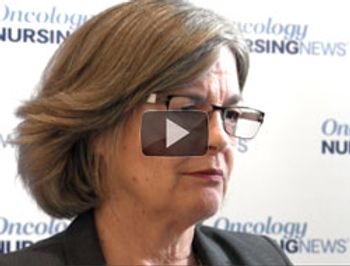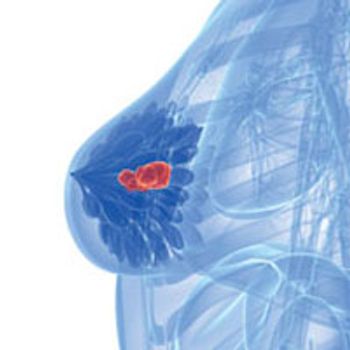
Marie Wood, MD, medical oncologist, University of Vermont, discusses the correlation between aspirin use and lower breast density.


Marie Wood, MD, medical oncologist, University of Vermont, discusses the correlation between aspirin use and lower breast density.

Hope S. Rugo, MD, director of Breast Oncology and Clinical Trials Education, UCSF Helen Diller Family Comprehensive Cancer Center, discusses the DigniCap cooling system to reduce the severity and frequency of hair loss in patients receiving chemotherapy for breast cancer.

Women with early-stage breast cancer who were treated with breast-conserving therapy (BCT) and radiation had improved survival after 10 years compared with those who had a mastectomy without radiation, according to research findings presented recently at the 2015 SABCS.

Practitioners awaiting guidelines for the optimum support of breast cancer survivors now have a resource to turn to with the release of a new clinical oncology breast cancer survivorship care guideline, a collaborative effort of ASCO and ACS.

A recent study has found that the majority of women at an increased risk of developing breast cancer either refuse or do not adhere to preventive treatment.

For women with heavily treated HER2-positive breast cancer, T-DM1 (ado-trastuzumab emtansine, Kadcyla) was found to improve overall survival (OS) by 7 months according to updated data from a phase III trial.

The immunotherapy pembrolizumab (Keytruda) demonstrated on overall response rate (ORR) of 12% in patients with ER-positive, HER2-negative advanced breast cancer in the phase 1b KEYNOTE-028 trial, marking the second early-stage trial to show antitumor activity with this agent in breast cancer.

A new study has shown that overall quality of life is similar among patients taking tamoxifen or anastrozole, but patient reports on their hot flashes, night sweats, vaginal dryness, and joint pain can help illuminate which therapy may be right for a particular woman. And, the analysis shows, age matters.

The immunotherapy agent avelumab yielded encouraging overall response rates (ORR) for patients with PD-L1–positive metastatic breast cancer and had an acceptable safety profile, according to findings reported at the San Antonio Breast Cancer Symposium (SABCS).

Denosumab not only promotes bone health, it confers a survival advantage, according to data from a follow-up analysis of the ABCSG-18 trial reported at the 2015 San Antonio Breast Cancer Symposium (SABCS).

The FDA has cleared for marketing the nation’s first cooling cap—the Dignitana DigniCap Cooling System—to reduce the severity and frequency of hair loss in patients receiving chemotherapy for breast cancer.

Jennifer Montes, MD, New York University Medical Center, discusses the role of nurses in treating patients with breast cancer.

Patients with breast cancer who have received anthracycline-based (ANTHR) chemotherapy may be more likely to experience "chemobrain"-a cancer-related cognitive impairment that can affect memory, attention, and physical function-than those treated with nonanthracycline-based regimens.

One of the great mysteries in oncology practice is the return of breast cancer many years after its initial diagnosis and treatment. And by many years, I mean 15 or even 20 years later, at a time when a woman least expects it to return.

As genetic testing becomes increasingly available, there will be a growing gap between the wide availability of testing and the relative importance of results to treatment decisions. In the current environment, there's more promise in precision medicine than practical applications in the exam room.

While recent advances in breast cancer therapy have resulted in survival gains, many patients and survivors have an increased risk of cardiovascular adverse events following treatment.

Women at an elevated risk of breast cancer may be able to avoid preventive procedures with regular aerobic exercise, according to a new study published in Breast Cancer Research and Treatment.

Accelerated partial breast irradiation (APBI) using multicatheter brachytherapy in patients with early-stage breast cancer was not inferior to conventional whole breast irradiation (WBI), according to a phase III study presented at the 2015 American Society for Radiation Oncology (ASTRO) Annual Meeting.

Rates are on the rise for both men and women.

Contralateral prophylactic mastectomies (CPM) have been a growing trend among women at average risk of breast cancer with a diagnosis of cancer in one breast, but the procedure is not medically recommended for this population.

The American Cancer Society (ACS) has revised its breast cancer screening guidelines, recommending that women at an average risk of breast cancer receive a mammography annually starting at age 45-5 years later than previous recommendations formulated in 2003.

Regardless of breast cancer subtype or stage, minority women are more likely to be diagnosed with more advanced-stage breast cancer and receive inappropriate treatment, a new study has found.

Genetic counseling before BRCA genetic testing improves patient knowledge, understanding, and satisfaction. However, a new analysis has found that most women undergoing BRCA genetic testing did not receive counseling prior to testing, despite national guidelines and recommendations.

Women with a certain type of breast cancer whose tumors have a favorable gene-expression profile may be able to safely avoid chemotherapy without an increased risk of recurrence, a new study has found.

Little is known about the potential benefits of adjuvant radiotherapy in older women diagnosed with triple-negative breast cancer (TNBC), but findings of a retrospective study reported at the 2015 Breast Cancer Symposium suggest that the approach may be worth considering for this population.